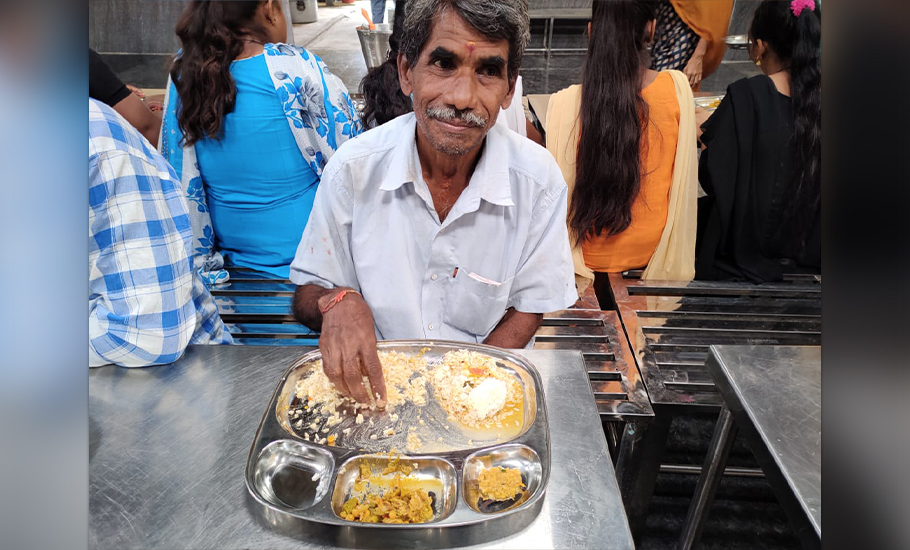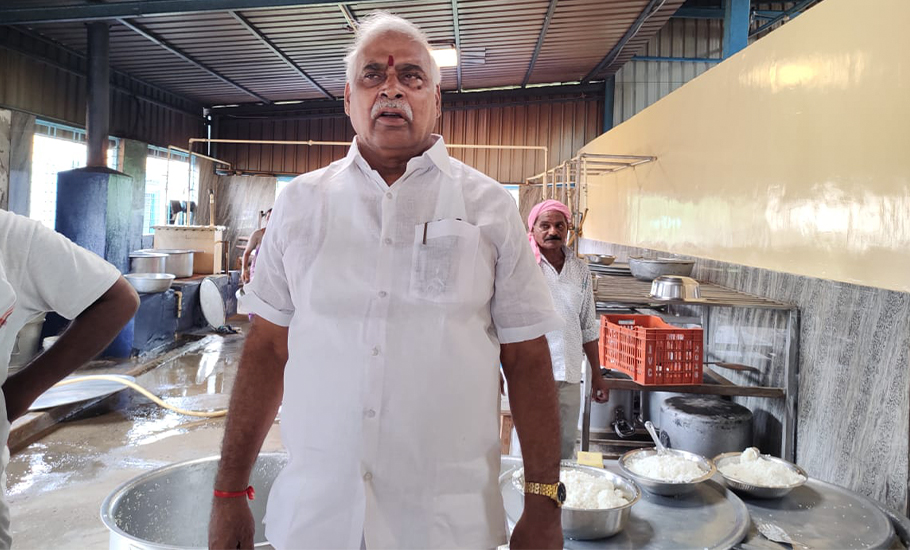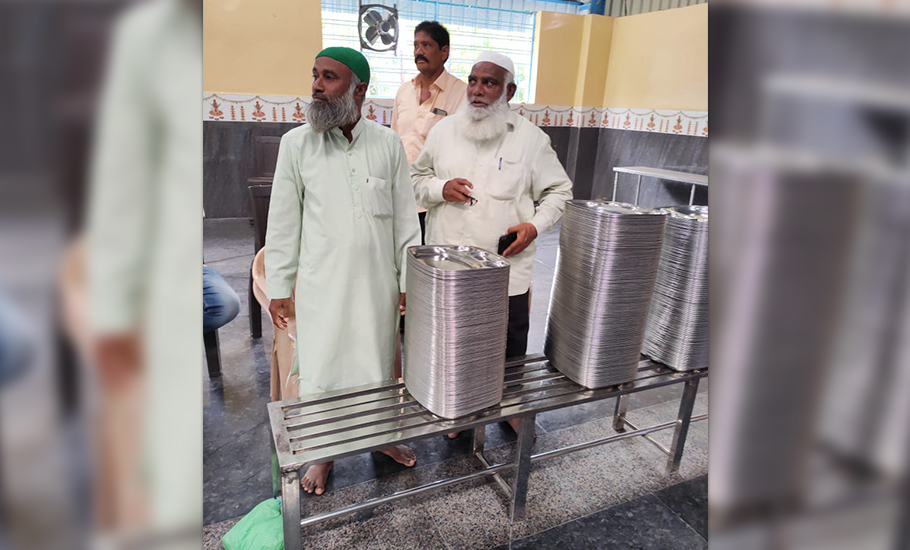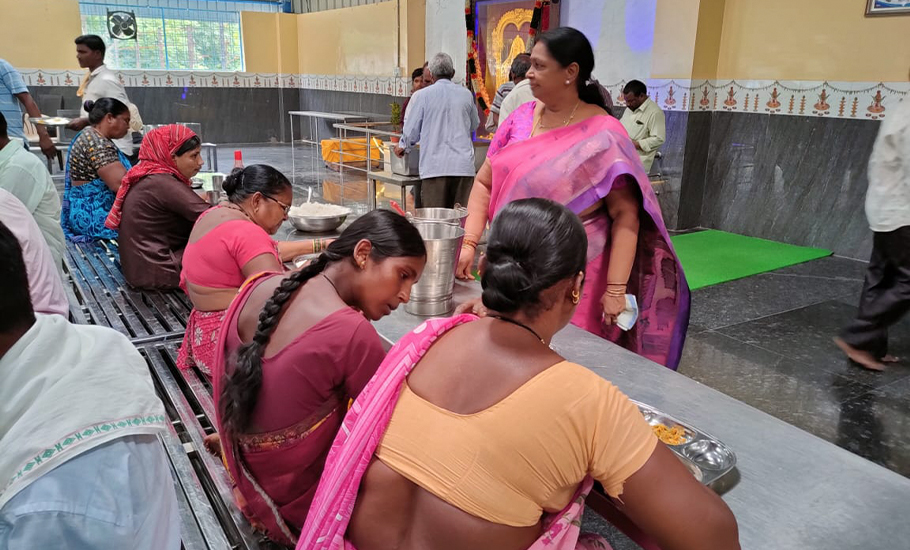
- Home
- News
- Analysis
- States
- Perspective
- Videos
- Education
- Entertainment
- Elections
- World Cup 2023
- Features
- Health
- Business
- Series
- Economy Series
- Earth Day
- Kashmir’s Frozen Turbulence
- India@75
- The legend of Ramjanmabhoomi
- Liberalisation@30
- How to tame a dragon
- Celebrating biodiversity
- Farm Matters
- 50 days of solitude
- Bringing Migrants Home
- Budget 2020
- Jharkhand Votes
- The Federal Investigates
- The Federal Impact
- Vanishing Sand
- Gandhi @ 150
- Andhra Today
- Field report
- Operation Gulmarg
- Pandemic @1 Mn in India
- The Federal Year-End
- The Zero Year
- Premium
- Science
- Brand studio
- Home
- NewsNews
- Analysis
- StatesStates
- PerspectivePerspective
- VideosVideos
- Entertainment
- ElectionsElections
- Sports
- Loading...
Sports - Features
- BusinessBusiness
- Premium
- Loading...
Premium

How a Telangana MLA is reaching out to people with his ‘kitchen cabinet’

Late one night during the lockdown imposed to contain Covid in 2020, Telangana Rashtra Samithi (TRS) MLA Koneru Konappa’s phone rang. The caller, who was shifting a severely ill Covid-19 patient to the hospital, was in need of food for six people. The group had already covered a long distance from the village Murligudem, 70 km far from Kagaznagar, the headquarters of Konappa’s...
Late one night during the lockdown imposed to contain Covid in 2020, Telangana Rashtra Samithi (TRS) MLA Koneru Konappa’s phone rang. The caller, who was shifting a severely ill Covid-19 patient to the hospital, was in need of food for six people. The group had already covered a long distance from the village Murligudem, 70 km far from Kagaznagar, the headquarters of Konappa’s constituency. The MLA’s family lost no time and put up a quick meal for the patient and his attendants in hurriedly arranged boxes. The MLA himself carried the food to the people who were on the way to Kagaznagar hospital and ensured the patient ate as well. Unfortunately, the patient died the next day but the work Konappa started continues in a more organised form serving close to 1,200-1,500 people on a daily basis.
“During the lockdown, Covid-19 patients were stuck without food or medicines. Many were traumatised and alone as close relatives also hesitated to meet them. Patients and their families were crying for food. I decided to reach out to them with our team with cooked food. We set up a call centre with four mobile numbers. The mobile numbers were widely circulated through our party workers and social media to every village. A 10-member volunteer team was constituted to carry food to the villages on bikes. This constituency has many villages far removed from any medical facility. Villagers as far as 50 km away from Kagaznagar started calling for food for family members or neighbours who were down with Covid-19,” Konappa tells The Federal.

“Once a family informed the call centre about the need for food, a bike-borne volunteer would rush to the village to deliver the food twice a day, first at 12 noon and later at 7 pm. The meal, neatly packed in carrying bags, contained rice, dal, chutney, curry or egg, and curd. And a banana is also given with lunch. Dry fruits were also served to the patients on alternate days,” Konappa informs.
Who Koneru Konappa is
A three-term MLA from Sirpur-Kagaznagar constituency in Telangana, Koneru Konappa is rarely seen delivering fiery speeches that is usual for politicians. The TRS legislator doesn’t appear before the media giving inane sound bites to make his presence felt. He is seldom seen hobnobbing with influential ministers or party’s top shot. That doesn’t mean Konappa is a recluse who stays away from people.

Konappa, ranked in the top league of TRS MLAs in terms of performance, is a hyper-local public leader, who anyone can easily reach out to anywhere in the town or his constituency. One needs to put in no great effort to get an audience with Konappa in Kagaznagar. This trait helps Konappa stand out from the party’s legislative members. His work of serving food to the hungry adds to his appeal as a public leader.
Kagaznagar was once a flourishing industrial town and enjoys the credit of being home to one India’s oldest paper mills — Sirpur Paper Mills — that began production in 1942, and now defunct Sirsilk Ltd, a textile company that started in 1946. The SPM, started by Nizam’s government, changed hands twice and is now owned by JK Papers. Konappa, who belongs to a settlers’ family, settled in Kagaznagar as an employee of Sirsilk factory.
Settlers are people who migrated to Telangana from Andhra Pradesh, mostly from Guntur and Krishna districts.
Konappa still lives in ‘Guntur Colony’ in Kagaznagar. When NT Ramarao during his stint as chief minister attempted reforms in the Panchayati Raj system in the early 1980s by creating Mandal and Zilla Parishad Territorial Constituencies (MPTC and ZPTC), Konappa’s family got an opportunity to enter politics and contest elections held for the rural constituencies. Later, Konappa took over from a family member. Slowly, he carved out a niche in the area and became an MLA in 2004 as a Congress candidate. In 2014, when he was denied a Congress ticket, he contested on the Bahujan Samaj Party symbol and won. He quickly changed sides and joined the TRS. He won the 2018 election on a TRS ticket.
A man from humble origins, without a caste affiliation to boost his electoral prospects and tag of ‘the settler’ acting to his disadvantage, Konappa had to figure out an alternative route to create a niche in the conventional Telangana political arena where money and caste play a key role. Konappa not only had to reach out to people with limited resources, but also overcome the odds stacked against him. He did not enjoy a grand social standing being a labourer-turned-politician, a settler, and an upper caste Kamma, in a sensitive tribal-dominated constituency.
He decided to reach out to people with help for a problem created by the demography and geography of the backward constituency — hunger.
A kitchen, set up at the MLA’s residence, worked for a year to serve food to lockdown-hit labourers during the first and second waves of Covid-19. His wife, son, brothers, and their wives were engaged in cooking the food and carefully packing the items that had to be carried over long distances on bikes.
The need for food, however, persisted in Kagaznagar even after Covid restrictions were lifted.
Nityannadana Satram
The constituency area extends up to the Maharashtra border 100 km away from Kagaznagar. Buses are few and far between in these villages. For the villagers and students who travelled to Kagaznagar every day, lunch is a serious problem. Students, who came from faraway villages to the junior colleges, skipped lunch or bunked classes in the afternoon to go home and eat. Farmers, especially the tribal people, who came to the town to consult a doctor or for other reasons, invariably skipped lunch. A proper meal was either not available, or not affordable, forcing people to remain hungry till they reach home.
So, Konappa decided to address the problem with a multi-pronged approach. He tailor-made the solution for different groups – midday meals in junior colleges, free food in exam coaching centres, simple feasts at the time of marriages of poor, and cooked food for the families struck by tragedies. While these services started at different points, they all came under the umbrella of Nityannadana Satram (Daily Free meals House).
People visiting the town no longer need to forego lunch. Steaming hot lunch is available at facility set up close to the hospital, RTC bus stand and market area.
To ensure this doesn’t get reduced to a populist steam that runs out of steam in due course, the food is cooked under the supervision of Konappa’s wife Ramadevi in a speckles hall with stainless steel plates and dining tables placed orderly.

“Nityannadana Satram is in no way inferior to the famous catering centres at Tirumala and Shirdi,” Satish, a medical representative who often visits the town from Karimnagar, tells The Federal. “Getting a vegetarian meal is a problem in the town. I often go back home without lunch. So, the Nithyannadana Satram has solved a major problem,” he adds.
Konappa has earned for himself the distinction of being the only MLA who is organising a Nityannadana Satram in the state outside the temple trusts and religious bodies.
On August 13, the Satram completed a year with a daily visitor count of 1,200 to 1,500. Named Koneru Konappa Nityannadan Satram, the house serves a three-course meal prepared with a fine variety of rice, dal and fresh vegetable curries in a hygienic environment. On the side are chutneys, which have come to be the highlight of the lunch.
The food service starts at 11.30 am and goes up to 3 pm. Besides the MLA’s wife Ramadevi and a few volunteers, 14 people work in the kitchen. Ramadevi arrives at Satram at 8 am and works till the food service closes in the afternoon. “My children are settled in Hyderabad. My husband is a retired employee. Since Annadanam is a sacred activity, my husband and I decided to do voluntary service at the Satram. I work in the kitchen,” says 67-year-old Anumandla Rajeswari.
Local youth and retired people from the town work as volunteers in the Satram. Though the entire programme goes in the name of Lord Venkateswara, Kasi Annapurna, and Bhagavan Buddha, there are Muslim volunteers too at the Annadanam.
A huge portrait of Lord Balaji flanked by Buddha and Goddess Annapurna adorn the wall of the dining hall. Talking about the logic of the combination of gods, Konappa says,” Buddha stands for peace and harmony, while Lord Balaji symbolises prosperity for the people. Goddess Annapurna stands for food for all. Before starting the Annadana Satram, I performed pujas for Annapurna Devi at Kashi with rice. And a bowl of sacred rice brought from Kashi was added to the rice meant to be cooked on the inaugural day of Satram in 2021,” he says.

In fact, Annadanam began as a small ‘meal counter’ after Covid restrictions were lifted to help the daily-wage labourers who used to come to the town from the villages. “Since hotels and messes had not reopened even after the lifting of the lockdown, visitors to the town, especially farmers, hawkers, and daily-wage labourers found it difficult to get food. Having seen their plight, a meal counter was set up in Kagaznagar to serve free meals for the needy. Roughly, we served lunch to 400 to 600 people a day. Later, the idea of Nityannadana Satram struck me as a permanent solution to the problem,” Konappa shares.
Where the money comes from
Serving free lunch for 1,200 to 1,500 people year-long is difficult for a man who is neither very rich, nor high-profile. Konappa acknowledged that though the activity is run by the Koneru family, it is the result of a collective effort of a number of friends and well-wishers.
“Cooperation from Municipal Administration minister KT Ramarao is invaluable. Initially, I spent Rs 1 crore to build the hall. To start with, I donated 450 tonnes of rice harvested from my land. Gradually, friends started joining me by donating rice and pulses. An MLA sent a truckload of rice a couple of days ago. But for the generous help from the friends and philanthropists, the Annadana Satram would not have seen the light of the day,” Konappa, who personally oversees the entire work of serving the food when he is town, says.
Talking to The Federal, Konappa said, he is contemplating ways to run it with a permanent source of monetary support and make it a permanent Annadanam like TTD or Shirdi. “Minister KTR has given the land on a 25-year lease. We will use the land as a source of support instead of depending on donations,” he says.
The idea of Nityannadana Satram
Danderi Hamsa often visits Kagaznagar for medical treatment. Her village is the farthest one from the constituency headquarters Kagaznagar. She comes by bus to Kagaznagar with her mother and two children. After visiting the doctor, they rush back home hungry as they can’t afford to have lunch in a hotel where it costs Rs 50 to Rs 70 per plate. Like Hamsa, 400 to 500 sick people and their attendants visit Kagaznagar for treatment from villages every day from distant villages. After the treatment, they go back home without lunch.
Srinivas Maruti is a painter under a contractor. He earns a wage Rs 300 per day. Earlier, he used to depend on a food stall that served lunch at Rs 20 but the stall disappeared after Covid. His wife, who is also a labourer, finds it difficult to pack a lunchbox for him. So, most of the times, Maruti would make do with cheap snacks for lunch.

With many like Danderi and Srinivas flocking the town, Konappa started the meals counter. As the counter proved inadequate, Konappa thought of a permanent arrangement for the poor. This idea took the form of Nityannadana Satram on August 13, 2021.
Serving food is the core activity
Though Konappa’s Charitable Trust is into many activities such as community marriages, running coaching centres to train the youth for competitive tests, skill development programmes etc, serving food to the needy is his core activity.
The organised meal programme began with a midday meal scheme for 2,500 students in five junior colleges in the constituency seven years back. Earlier, the activity of serving food was confined to occasions of community marriages the MLA organizes once every year.
The predominantly rural and forest geography of the constituency is the primary reason that forced him to think of ways to ensure food reaches the hungry. A tragic incident that occurred in his presence when he was on a visit to a junior college compelled him to think of a permanent solution for lunch in junior colleges in the constituency.
“The students of junior colleges come from distant villages. It is difficult for their poor families to prepare a lunchbox early in the morning. So, many students either skip lunch or bunk the classes in the afternoon. I saw a boy fall unconscious at a college function where I was the chief guest. The students told me that the boy fell due to a lack of food since morning. This forced me to think of a midday meal scheme for junior colleges. We set up a makeshift kitchen at my house the very next day and started sending cooked meals to students of the junior college. Later, separate kitchens were set up in the five villages where junior colleges are located in the constituency. All the 2,500 students get the midday meal from October to March every year when students start preparing for exams,” he says adding proudly that the scheme had improved attendance in colleges.
Community marriages and Konappa’s feasts
Konappa organises community marriages for the poor in a unique way. The marriages are conducted as per the tradition of couples’ caste or religion. A simple venue is set up for the ceremony. Hindu marriages are solemnized by a priest. Konappa and Ramadevi act as elders of the family. Gifts, including the gold mangal sutra, are given as per the custom. The district collector and SP and other senior officials, and people’s representatives attend the wedding.
A simple marriage feast is organised for the relatives of the couple and other guests. After the marriage, transport is organised for the newlywed to reach home. The convention started in March 2006 when Konappa’s daughter was getting married. In the same marriage hall, the MLA organised marriages for 21 couples from SC, ST, and OBC families. Later, on the occasion of his son’s marriage, another 22 couples got married at the same venue. A simple feast was served to nearly 3,000 guests of these families. The practice is still going on.
“Last year marriages of 24 couples were organised. The highlight of the occasion is the marriage feast. In Telangana, every social occasion, marriage, or death is accompanied by a feast. The feast is a prestigious matter for both parties. Without a feast, however simple it is, social functions like marriage are incomplete. Every year, as a mark of the happy ending to the community marriage, a simple feast is organised for the relatives of both sides. Later, the MLA and his wife offer traditional gifts to the newlywed before seeing them off,” Anjibabu, a volunteer, tells The Federal.

“Another occasion when the people need food is when families are struck with tragedies. Apart from extending help for last rites, cooked food is served to 50 to 100 members. Our volunteers take the food to the village irrespective of the distance,” Anji said.
The man who makes it all possible maybe a politician but he stays away from political talk. Not once, while talking to this reporter, did Konappa talk of the possibility of early polls in Telangana, prospects of BJP and Congress in the state, or political commotion around him. He is more interested in ensuring Annadana Satram stands on its own with a sustainable system of funding. “This is my way of reaching out to people. I am not interested in other aspects of politics,” Konappa says.

